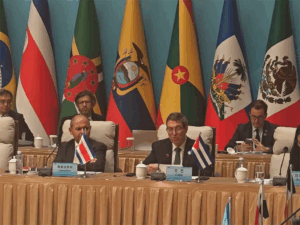 Havana, Cuba.- The Minister of Foreign Affairs of Cuba, Bruno Rodríguez Parrilla, emphasized the relevance of collaboration within the China-CELAC Forum in the current global context, which is characterized by the United States’ attempts to reshape the international order.
Havana, Cuba.- The Minister of Foreign Affairs of Cuba, Bruno Rodríguez Parrilla, emphasized the relevance of collaboration within the China-CELAC Forum in the current global context, which is characterized by the United States’ attempts to reshape the international order.
This was stated by Rodríguez at the Fourth Ministerial Meeting of the China-CELAC Forum (Community of Latin American and Caribbean States).
He rejected the United States’ efforts to reshape the international order through coercion, threats, and the imposition of tariffs and other punitive measures, which have a detrimental impact on global political and economic interactions.
On the other hand, the head of Cuban diplomacy highlighted that the Forum, established following the second CELAC Summit in Havana in 2014, has developed into a valuable platform for enhancing and strengthening cooperation between the two parties.
Similarly, he pointed out that this mechanism has proven its strategic and practical worth in advancing towards shared development goals, highlighting the advantages of creating a community with a united future.
In this regard, Rodríguez asserted that at present, the majority of Latin American and Caribbean nations maintain diplomatic ties with China, based on mutual respect and cooperation that yields tangible advantages.
Conversely, the U.S. government is actively promoting a trade and tariff conflict on a global scale, particularly against China, and is issuing threats to nations that are legitimately pursuing economic development initiatives with companies from that nation.
At another point of his speech, the Cuban representative recalled that this year marks the 65th anniversary of Cuba’s diplomatic ties with China, which have been a beacon of South-South cooperation throughout history.
He emphasized Cuba’s unwavering commitment to the One China principle and its opposition to any efforts to undermine the territorial integrity and sovereignty of this nation.
He also acknowledged the Chinese government’s endeavors, particularly those related to the Belt and Road, the Global Development, and the China-CELAC Cooperation Plan (2022-2024), which have resulted in significant socioeconomic projects in the region.